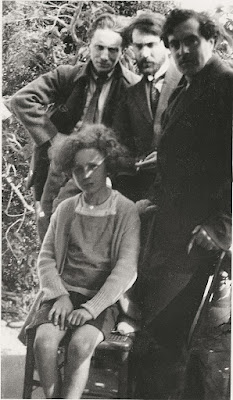ALIEN: COVENANT
Alien:
Covenant (director Ridley Scott, starring Michael Fassbender, Katherine
Waterston)
This seems to be the most
interesting entry in the Alien franchise after the first film but coming
rather belatedly when the director Ridley Scott is on the verge of becoming an
octogenarian. Obviously at that age people begin to consider their own
mortality and the script is much more introspective than previous instalments
except for Prometheus. There are
references to high art such as Michaelangelo, Wagner and P.B.Shelley but they
are somehow integrated into a script which is both insightful and hollow. The script, however, is the main issue with
the film. Visually Covenant offers us
some new and intriguing sights but the sound design (I hesitate to use the term
soundtrack because that isn’t quite right) is the feature that sets the film
apart. A dull rhythmic thud accompanies
the action along with some intriguing leitmotifs
(obviously, Wagner is referenced seemingly because Scott believes it to be
apt but it counterpoints the level of audio and image integration which seems
to be the main dynamic of the film.).
There is time for John Denver too since his ‘Country Roads’ is the “signal”
from the “alien planet” which is rather like New Zealand. The main problem with the film is its
predictability. Firstly, the previous
instalments but also because we know that the zapping of aliens is the core of
the film not the meaning of life bullshit tagged along with it.
For all that Covenant has succeeded to an extent in providing the meaning of the franchise but not
perhaps the meaning of life by making an already implicit connection between
the robots and the aliens more explicit. In Alien the robot Ash (played by Ian Holm) attempts to protect the alien from destruction, part of the remit of his duties provided by the corporation he serves. The robot David from Prometheus, has become another
Frankenstein stirring chemicals and mixing alien genes in his cracked
laboratory. He wishes to be another Darwin
poised on the brink of the discovery of the dynamic of existence even if he
finds it difficult to remember the actual authors of the poems he loves. As well as Mary Shelley, her husband Percy
Shelley and his poem Ozymandias is referenced but he thinks its Byron’s
poem. David is clearly entertaining
senior moments and coming out with the kind of guff often found in gentlemen’s
clubs as when he declares that any person writing such a poem must die
happy. This may be true of Ozymandias, The Ring or The David but can it be true of Covenant. David discovers his doppelganger Walter, the
robot brought by the ship’s crew to the alien planet (the one that resembles
New Zealand) and has a fight with him, what else? The crew discover the kind of tampering and meddling
that David has been getting up to as they encounter the varieties of alien that
David has so far been able to produce.
There is actual suspense
in the film which is oblivious to the cosmic meanderings that Scott and his
scriptwriter are indulging in and lots of tomato sauce is sprayed around. The success of the action is in convincing us
of the suspense since it would be so incredibly easy to suspend our
disbelief. This and the thrumming score,
the success of key images but not the deployment of some of Scott’s high
culture references. Also notable are the
performances of Fassbender and Waterston.
The key point is, who can
distinguish David from Walter? Indeed,
this is where the film ends with Waterston realising that Walter is really
David. This leads onto a scene where
David regurgitates some alien foetuses (why not?). The thrumming beat of Wagner’s ‘Entry of the
Gods into Valhalla’ summarises the film’s plot whereby homeless, wandering
mankind seems to find a home just as the gods in Wagner's Ring Cycle are locked out of their home, Valhalla, by the giants Fasolt and Fafner. However,
this supposed new home is really a viper’s nest and therefore the ship must move on restlessly,
relentlessly to the next destination.
The Oedipal backchat whereby the child somehow becomes a father to
aliens that are brothers and sisters but also daughters and sons is lost in the
general clanging of the regurgitated alien baby nest and the portentous booming
chords of a sound track that has somehow found a home. How Wagner might have appreciated such a film
since his libretti were so limited too.
Paul Murphy

Comments